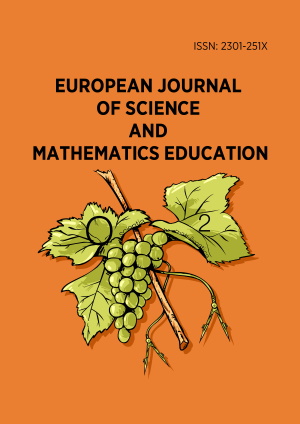Research Article
Using inquiry-based interventions to improve secondary students’ interest in science and technology
More Detail
1 Département de didactique, Université du Québec à Montréal, Montréal, Canada2 Facultéd’éducation, Université de Sherbrooke, Sherbrooke, Canada* Corresponding Author
European Journal of Science and Mathematics Education, 5(3), July 2017, 262-270, https://doi.org/10.30935/scimath/9510
OPEN ACCESS 3971 Views 1818 Downloads
ABSTRACT
Nine secondary school teachers participated in a five day training program where they developed inquiry-based pedagogical interventions for their science classes. Student interest and self-concept in school science and technology were measured before and after the interventions. Increases in interest and self-concept were compared with the results obtained from control groups. Results show a significant increase interest of moderate magnitude compared with the control condition, but no effect on self-concept. Our interpretation supports the use of inquiry based interventions for science classes but also presents some of the challenges faced when developing them.
CITATION (APA)
Potvin, P., Hasni, A., & Sy, O. (2017). Using inquiry-based interventions to improve secondary students’ interest in science and technology. European Journal of Science and Mathematics Education, 5(3), 262-270. https://doi.org/10.30935/scimath/9510
REFERENCES
- Bhattacharyya, S., Volk, T., & Lumpe, A. (2009). The influence of an extensive inquiry-based field experience on pre-service elementary student teachers’ science teaching beliefs. Journal of Science Teacher Education, 20, 199–218. doi:10.1007/s10972-009-9129-8
- Brickhouse, N. W. (1990). Teachers’beliefs about the nature of science and their relationship to classroom practice. Journal of Teacher Education, 41(3), 53–62. doi:10.1177/002248719004100307
- Brouillette, N., Potvin, P., & Samson, G. (2016). Effet d’activités exploitant la démarche de conception technologique sur l’intérêt des élèves à l’égard de la science et de la technologie. Paper presented at the 84thcongress of the Acfas, Universityof Quebec at Montreal, Quebec.
- Brown, S. L., & Melear, C. T. (2006). Investigation of secondary science teachers’ beliefs and practices after authentic inquirybased experiences. Journal of Research in Science Teaching, 43(9), 938–962. doi:10.1002/tea.20110
- Cavas, P. (2011). Factors affecting the motivation of Turkish primary students for science learning. Science education international, 22(1), 31–42.
- Clark, R. E. (1983). Reconsidering research on learning from media. Review of Educational Research,53, 445–459.
- Cockley, K. (2000). An investigation of academic self-concept and its relationship to academic achievement in African American college students. Journal of Black Psychology, 26(2), 148–164.
- Cohen, J. (1988). Statistical power analysis for the behavioral sciences (second ed.): Routledge.
- Crawford, B. A. (2000). Embracing the essence of inquiry: new roles for science teachers. Journal of Research in Science Teaching, 37(9), 916–937.
- Ergül, R., Simskeli, Y., Calis, S., Ozdilek, Z., Gocmencelebi, S., & Sanli, M. (2011). The effects of inquiry-based science teaching on elementary school students’ science process skills and science attitudes. Bulgarian Journal of Science and Education Policy, 5(1), 48–66.
- Furtak, E. M., Seidel, T., Iverson, H., & Briggs, D. C. (2012). Experimental and quasi-experimenal studies of inquiry-based science teaching: A meta-analysis. Review of Educational Research, 82(3), 300–329. doi:10.3102/0034654312457206
- Geier, R., Blumenfeld, P. C., Marx, R. W., Krajcik, J. S., Fishman, B., Soloway, E., &Clay-Chambers, J. (2008). Standardized test outcomes for students engaged in inquiry-based science curricula in the context of urban reform. Journal of Research in Science Teaching, 45(8), 922–923. doi:10.1002/tea.20248
- Gibson, H. L., & Chase, C. (2002). Longitudinal impact of an inquiry-based science program on middle school students' attitudes toward science. Science Education, 86(5), 693–705. doi:10.1002/sce.10039
- Gormally, C., Brickman, P., Hallar, B., & Armstrong, N. (2009). Effects of inquiry-based learning on students’ science literacy skills and confidence. International Journal for the Scholarship of Teaching and Learning, 3(2), 1–22. doi:10.20429/ijsotl.2009.030216
- Harris, C. J., & Rooks, D. L. (2010). Managing inquiry-based science: challenges in enacting complex science instruction in elementary and middle school classrooms. Journal of Science Teacher Education, 21(2), 227–240. doi:10.1007/s10972-009-9172-5
- Hasni, A., & Potvin, P. (2015a). L'intérêt pour les sciences et la technologie à l'école: Résultats d'une enquête auprès d'élèves du primaire et du secondaire au Québec. Retrieved from Montréal:
- Hasni, A., & Potvin, P. (2015b). Student’s interest in science and technology and its relationships with teaching methods, family context and self-efficacy. International Journal of Environmental and Science Education, 10(3), 337–366. doi:10.12973/ijese.2015.249a
- Hattie, J. (2009). Visible learning: A synthesis of over 800 meta-analyses relating to achievement. NewYork, NY: Routledge.
- Hidi, S., & Renninger, K. A. (2006). The four-phase model of interest development. Educational Psychologist, 41(2), 111–127.
- Keys, C. W., & Bryan, L. A. (2001). Co-constructing inquiry-based science with teachers: Essential research for lasting reform. Journal of Research in Science Teaching, 38(6), 631–645. doi:10.1002/tea.1023
- Kirschner, P. A., Sweller, J., & Clark, R. E. (2006). Why minimal guidance during instruction does not work: An analysis of the failure of constructivist, discovery, problem-based, experiential, and inquiry-based teaching. Educational Psychologist, 41(2), 75–86.
- Lazonder, A. W., & Harmsen, R. (2016). Meta-analysis of inquiry-based learning: Effects of guidance. Review of Educational Research, 86(3), 681–718. doi:10.3102/0034654315627366
- Lee, O., Heart, J. E., Cuevas, P., & Enders, C. (2004). Professional development in inquiry-based science for elementary teachers of diverse student groups. Journal of Research in Science Teaching, 41(10), 1021–1043. doi:10.1002/tea.20037
- Luft, J. A. (2001). Changing inquiry practices and beliefs: The impact of an inquiry-based professional development programme on beginning and experienced secondary science teachers. International Journal of Science Education, 23(5), 517–534. doi:10.1080/09500690121307
- Minner, D. D., Levy, A. J., & Century, J. (2010). Inquiry-based science instruction—What is it and does it matter? Results from a research synthesis years 1984 to 2002. Journal of Research in Science Teaching, 47(4), 474–496. doi:10.1002/tea.20347
- Patrick, R., B., & Gibbs, J. C. (2012). Inductive discipline, parental expression of disappointed expectations, and moral identity in adolescence. Journal of Youth and Adolescence, 41(8), 973–983. doi:10.1007/s10964-011-9698-7
- Potvin, P., & Hasni, A. (2014a). Analysis of the decline in interest towards school science and technology from Grades 5 through 11. Journal of Science Education and Technology, 23(6), 784–802. doi:10.1007/s10956-014-9512-x
- Potvin, P., & Hasni, A. (2014b). Interest, motivation and attitude towards science and technology at K-12 levels: A systematic review of 12 years of educational research. Studies in Science Education, 50(1), 85–129. doi:10.1080/03057267.2014.881626
- Potvin, P., & Hasni, A. (2016). Une CAP qui s’inspire des résultats de recherche et qui en produit dans le but de favoriser l’intérêt des élèves à l’égard des sciences et de la technologie. Paper presented at the 84th ACFAS Conference, Université du Québec à Montréal, Québec.
- Reid, N., & Skryabina, E. A. (2002). Attitudes towards physics. Research in Science & Technological Education, 20(1), 67-81.
- Roche, J., O'Neill, A., & Prendergast, M. (2016). An inquiry-based learning intervention to support post-primary engagement with science, technology, engineering and mathematics. European Journal od Science and Mathematics Education, 4(4), 431–439.
- Singh, K., Granville, M., & Dika, S. (2002). Mathematics and science achievement: Effects of motivation, interest, and academic engagement. TheJournal of Educational Research, 95(6), 323–332.
- Wee, B., Shepardson, D., Fast, J., & Harbor, J. (2007). Teaching and learning about inquiry: Insights and challenges in professional development. Journal of Science Teacher Education, 18(1), 63–89. doi:doi:10.1007/s10972-006-9031-6
- Wolf, S. J., & Fraser, B. J. (2008). Learning environment, attitudes and achievement among middle-school science students using inquiry-based laboratory activities. Research in Science Education, 38(3), 321–341. doi:10.1007/s11165-007-9052-y


 The articles published in this journal are licensed under the CC-BY Creative Commons Attribution International License.
The articles published in this journal are licensed under the CC-BY Creative Commons Attribution International License.